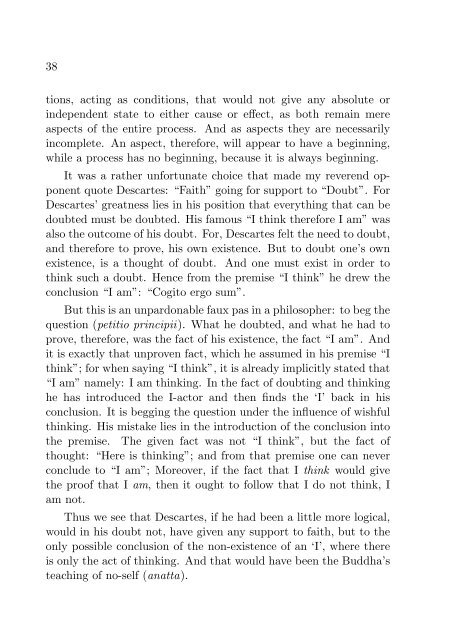Towards the Truth
Notes from a three-day debate in the 1940’s about Buddhism and Christianity.
Notes from a three-day debate in the 1940’s about Buddhism and Christianity.
You also want an ePaper? Increase the reach of your titles
YUMPU automatically turns print PDFs into web optimized ePapers that Google loves.
38<br />
tions, acting as conditions, that would not give any absolute or<br />
independent state to ei<strong>the</strong>r cause or effect, as both remain mere<br />
aspects of <strong>the</strong> entire process. And as aspects <strong>the</strong>y are necessarily<br />
incomplete. An aspect, <strong>the</strong>refore, will appear to have a beginning,<br />
while a process has no beginning, because it is always beginning.<br />
It was a ra<strong>the</strong>r unfortunate choice that made my reverend opponent<br />
quote Descartes: “Faith” going for support to “Doubt”. For<br />
Descartes’ greatness lies in his position that everything that can be<br />
doubted must be doubted. His famous “I think <strong>the</strong>refore I am” was<br />
also <strong>the</strong> outcome of his doubt. For, Descartes felt <strong>the</strong> need to doubt,<br />
and <strong>the</strong>refore to prove, his own existence. But to doubt one’s own<br />
existence, is a thought of doubt. And one must exist in order to<br />
think such a doubt. Hence from <strong>the</strong> premise “I think” he drew <strong>the</strong><br />
conclusion “I am”: “Cogito ergo sum”.<br />
But this is an unpardonable faux pas in a philosopher: to beg <strong>the</strong><br />
question (petitio principii). What he doubted, and what he had to<br />
prove, <strong>the</strong>refore, was <strong>the</strong> fact of his existence, <strong>the</strong> fact “I am”. And<br />
it is exactly that unproven fact, which he assumed in his premise “I<br />
think”; for when saying “I think”, it is already implicitly stated that<br />
“I am” namely: I am thinking. In <strong>the</strong> fact of doubting and thinking<br />
he has introduced <strong>the</strong> I-actor and <strong>the</strong>n finds <strong>the</strong> ‘I’ back in his<br />
conclusion. It is begging <strong>the</strong> question under <strong>the</strong> influence of wishful<br />
thinking. His mistake lies in <strong>the</strong> introduction of <strong>the</strong> conclusion into<br />
<strong>the</strong> premise. The given fact was not “I think”, but <strong>the</strong> fact of<br />
thought: “Here is thinking”; and from that premise one can never<br />
conclude to “I am”; Moreover, if <strong>the</strong> fact that I think would give<br />
<strong>the</strong> proof that I am, <strong>the</strong>n it ought to follow that I do not think, I<br />
am not.<br />
Thus we see that Descartes, if he had been a little more logical,<br />
would in his doubt not, have given any support to faith, but to <strong>the</strong><br />
only possible conclusion of <strong>the</strong> non-existence of an ‘I’, where <strong>the</strong>re<br />
is only <strong>the</strong> act of thinking. And that would have been <strong>the</strong> Buddha’s<br />
teaching of no-self (anatta).
















